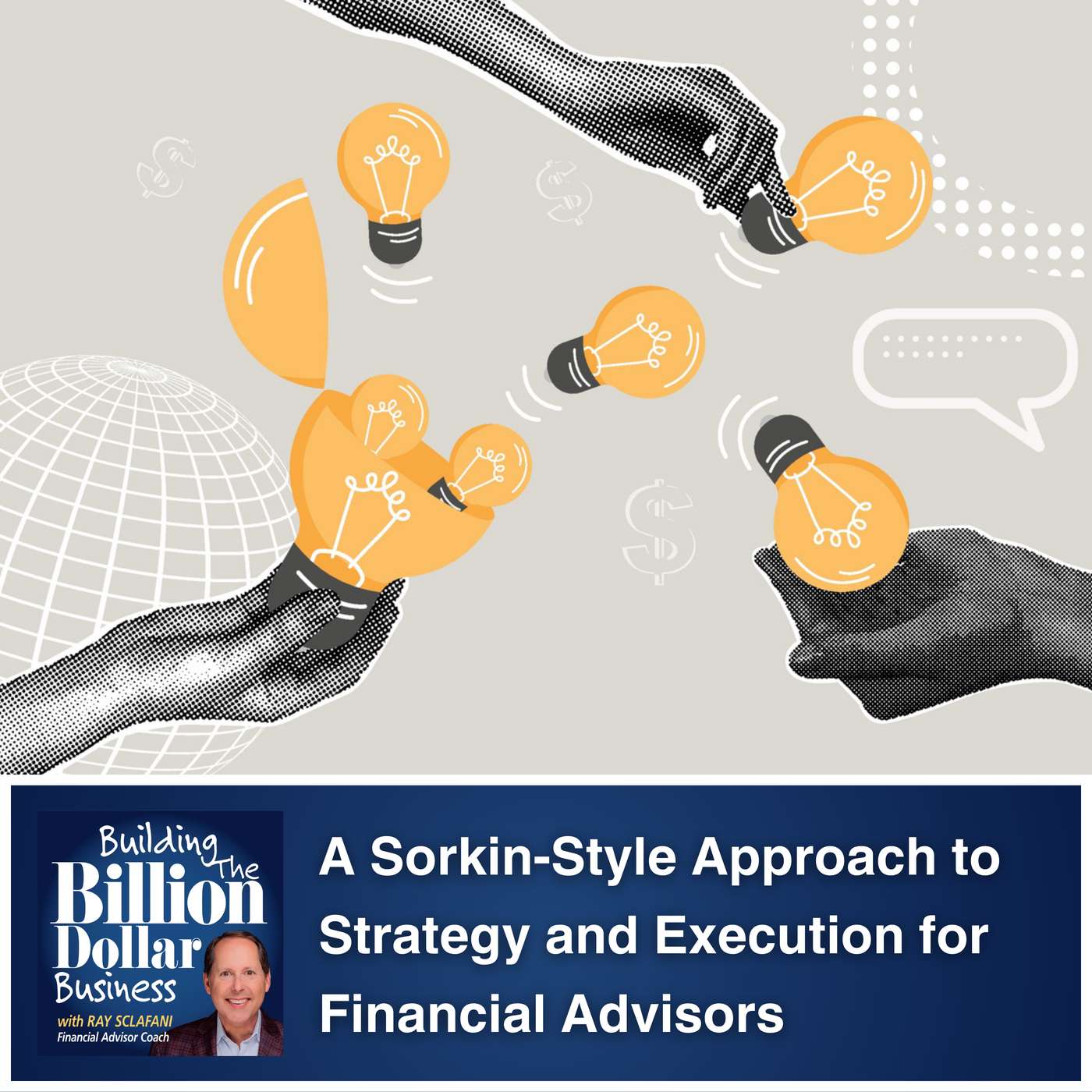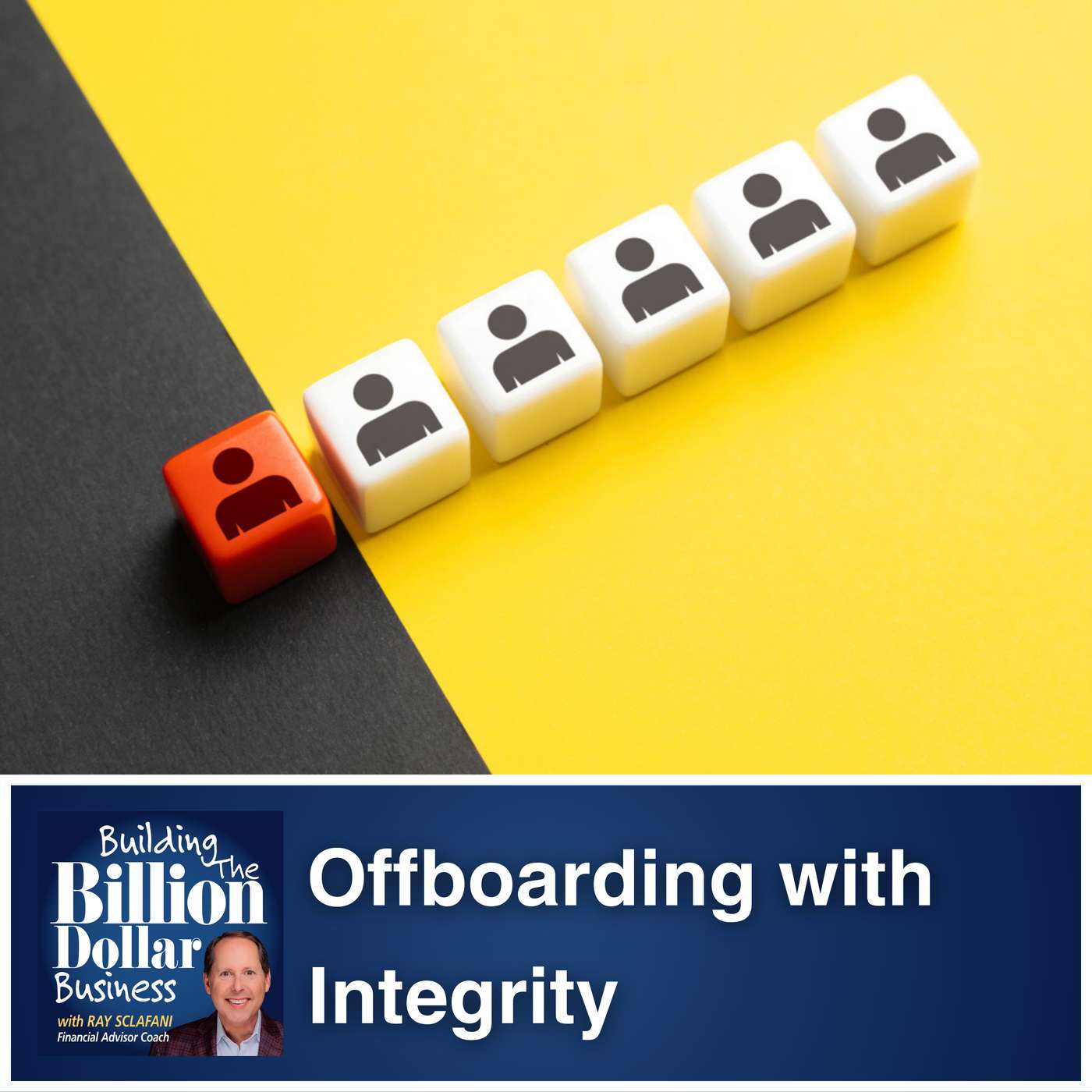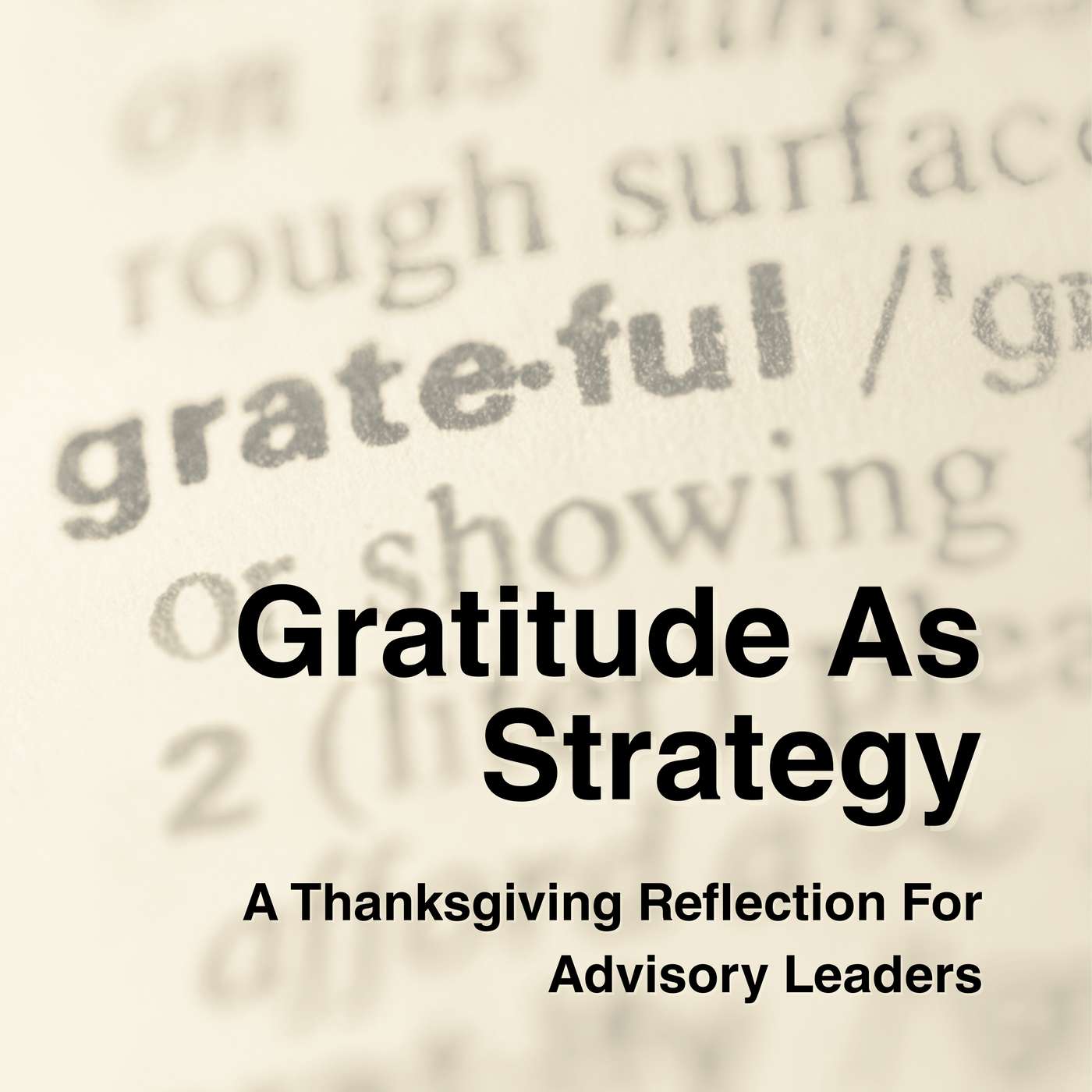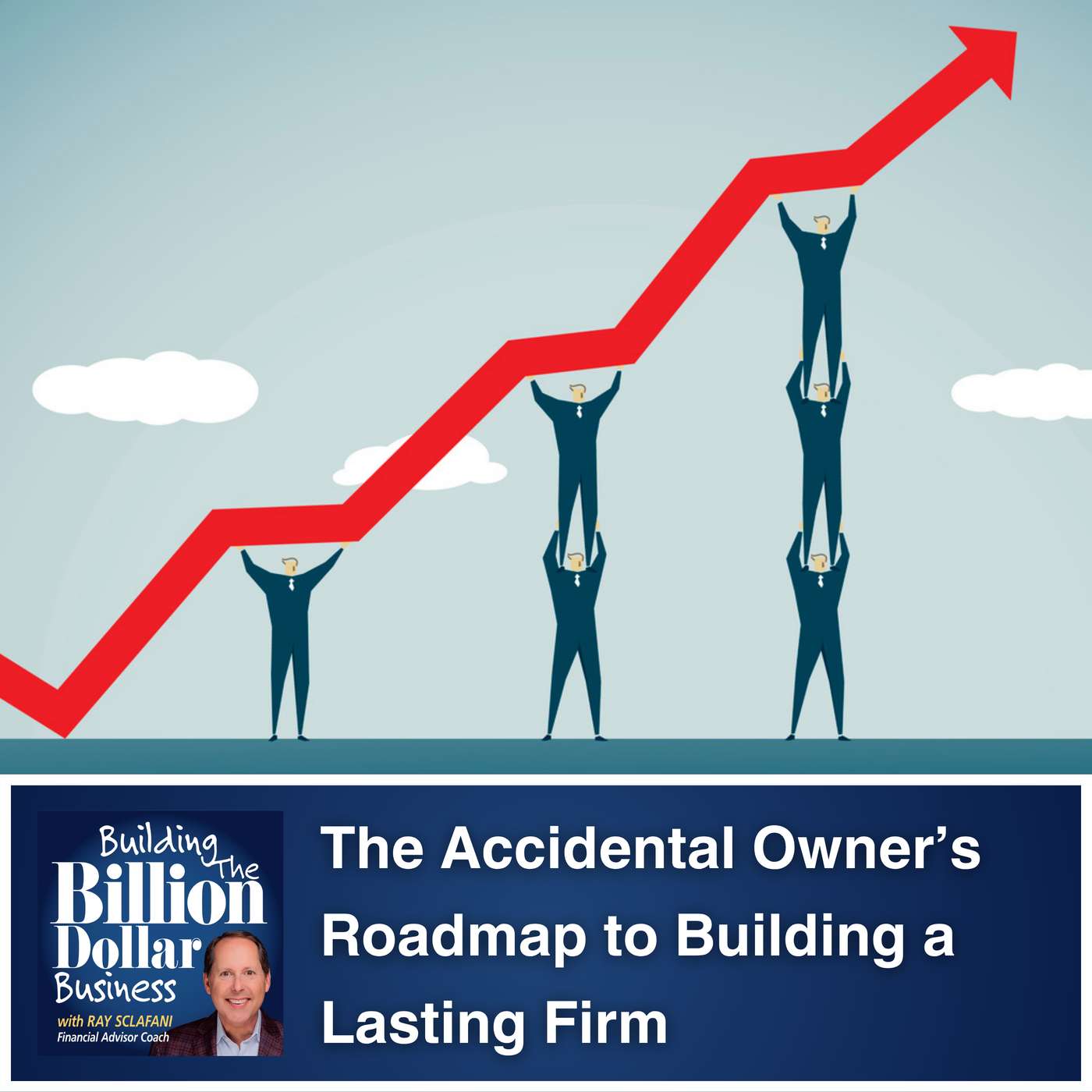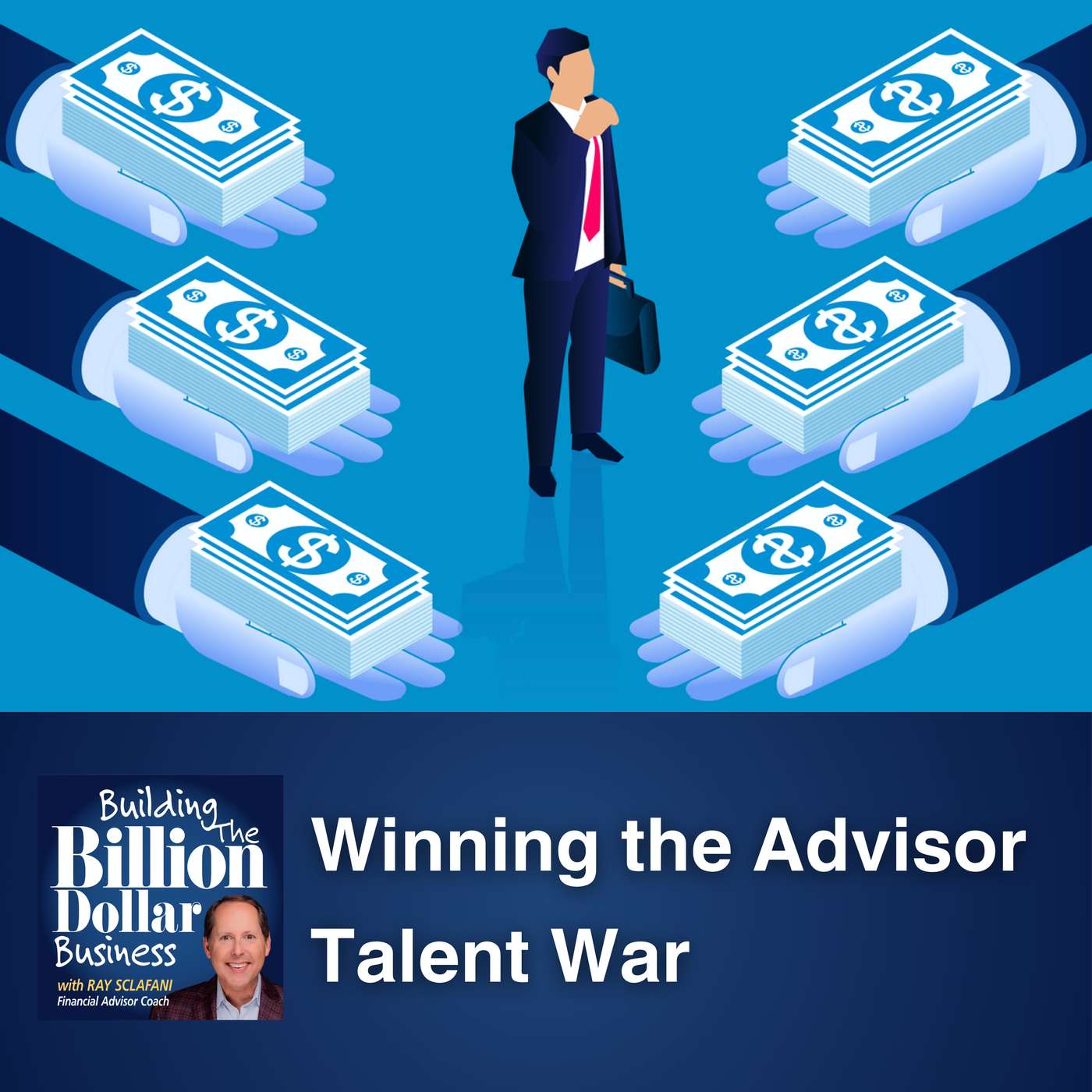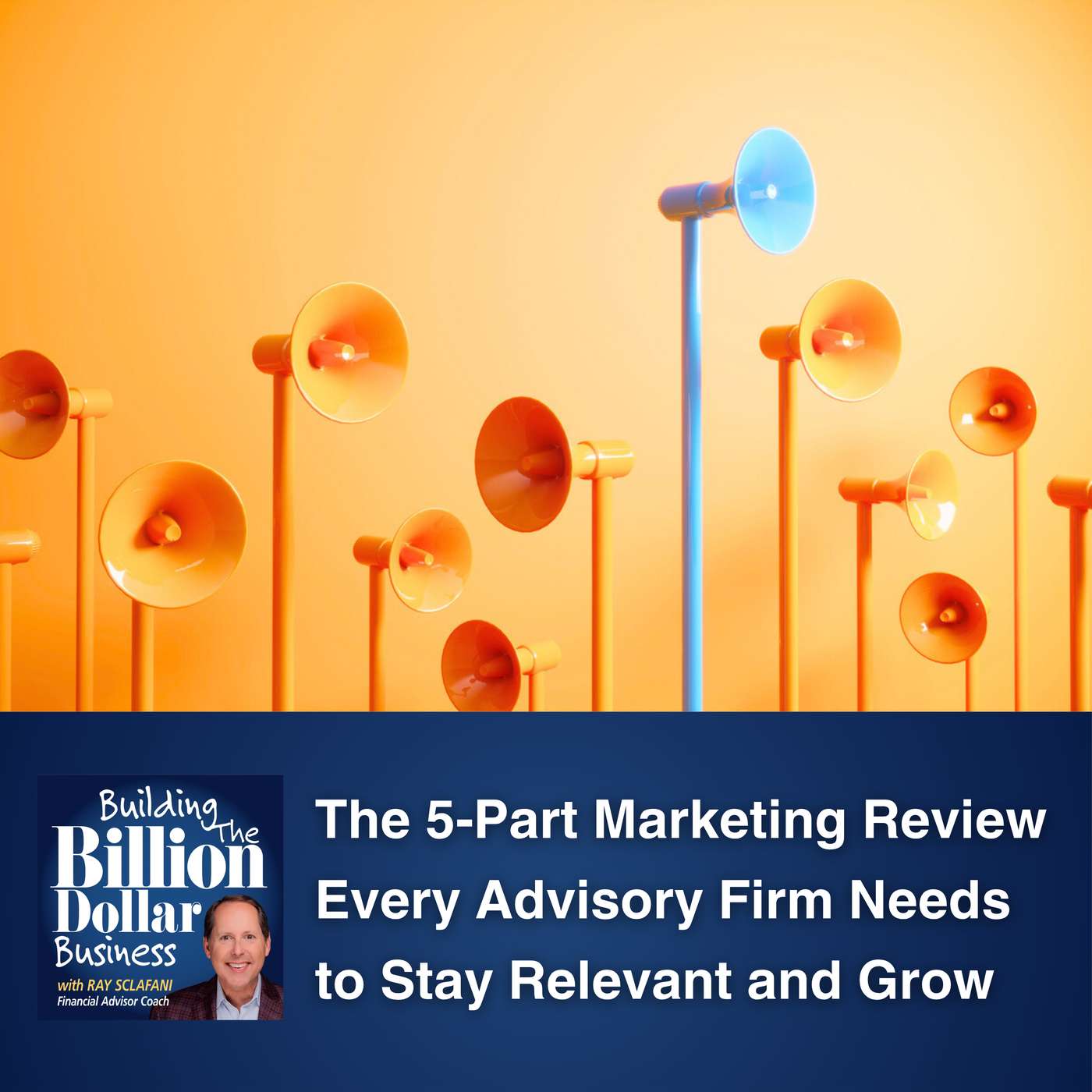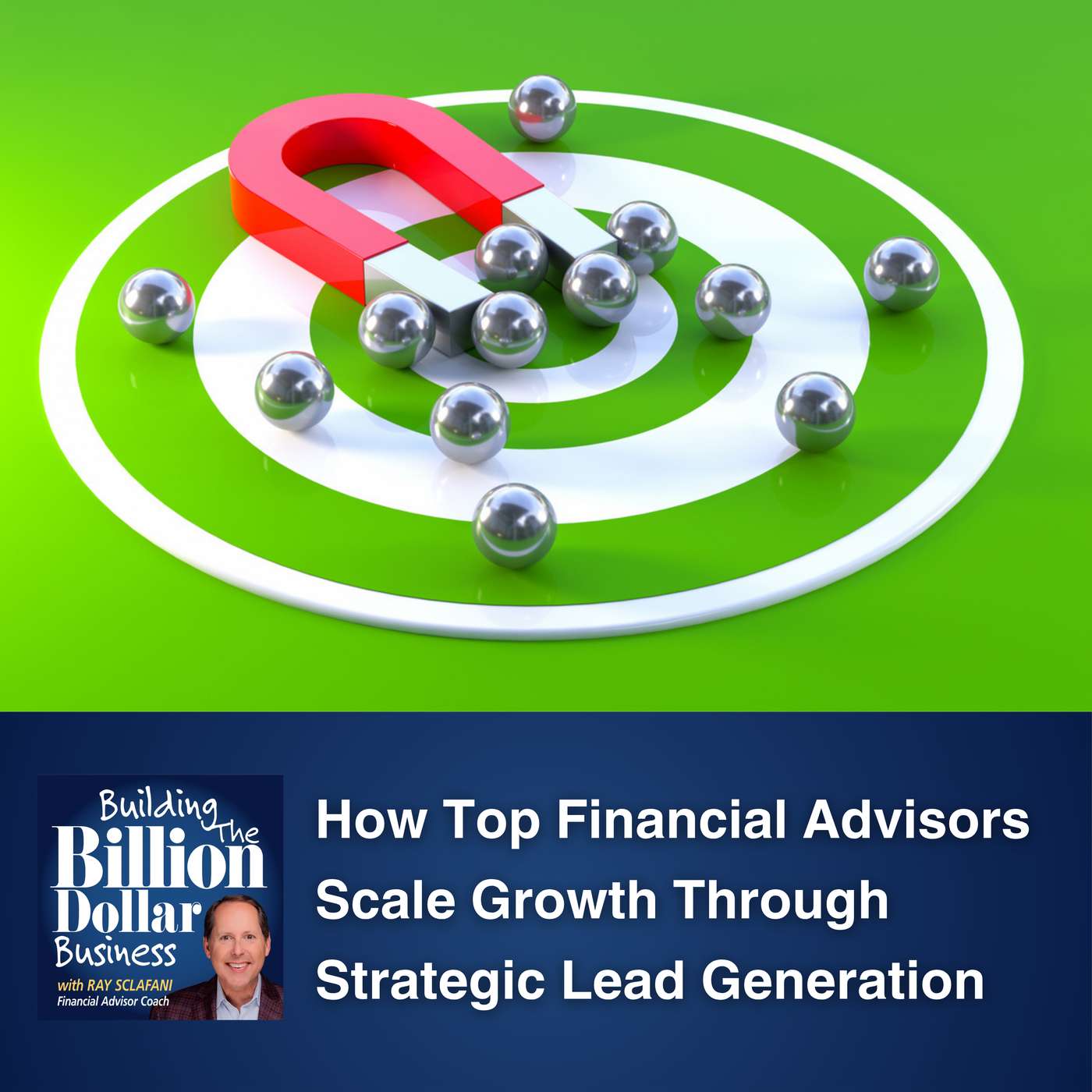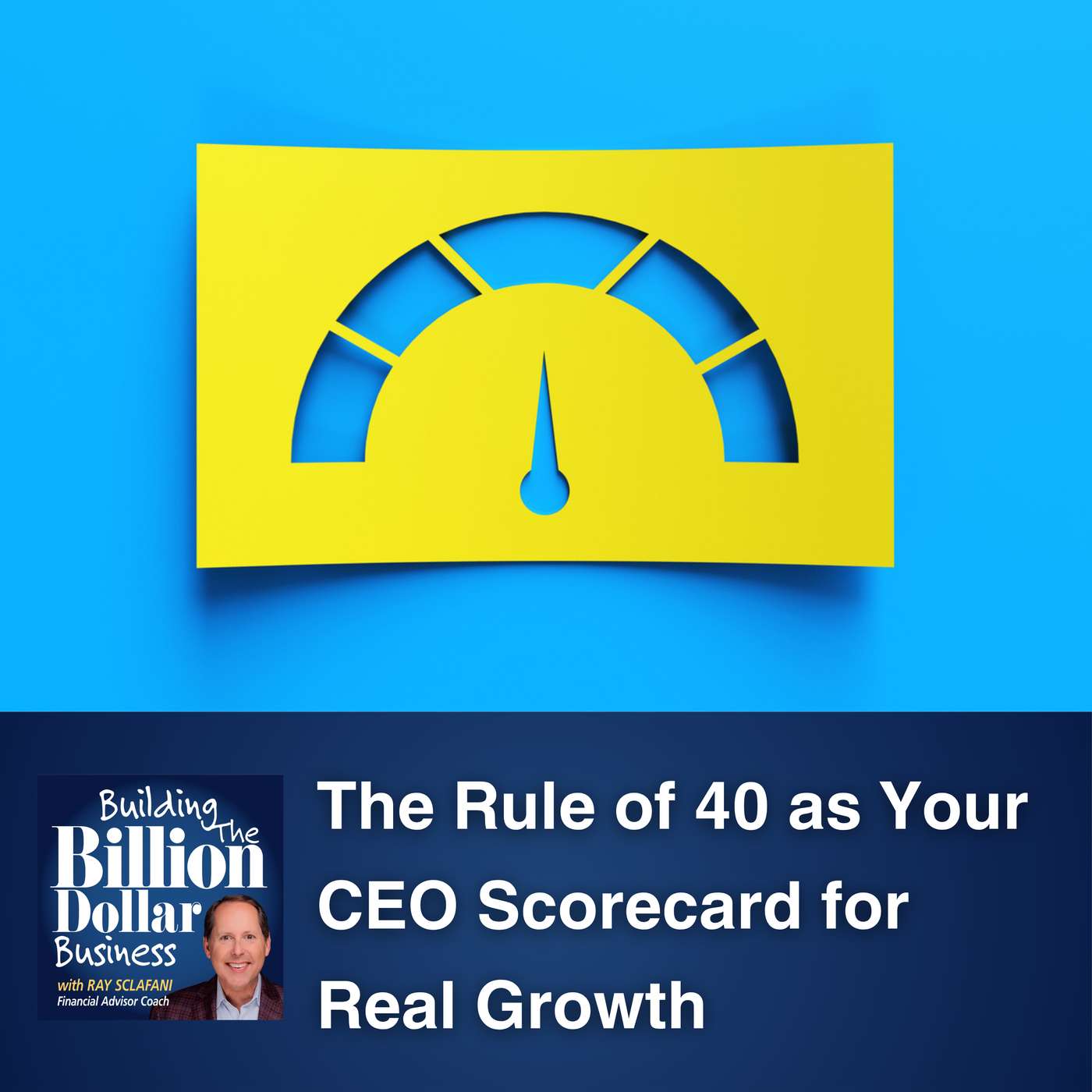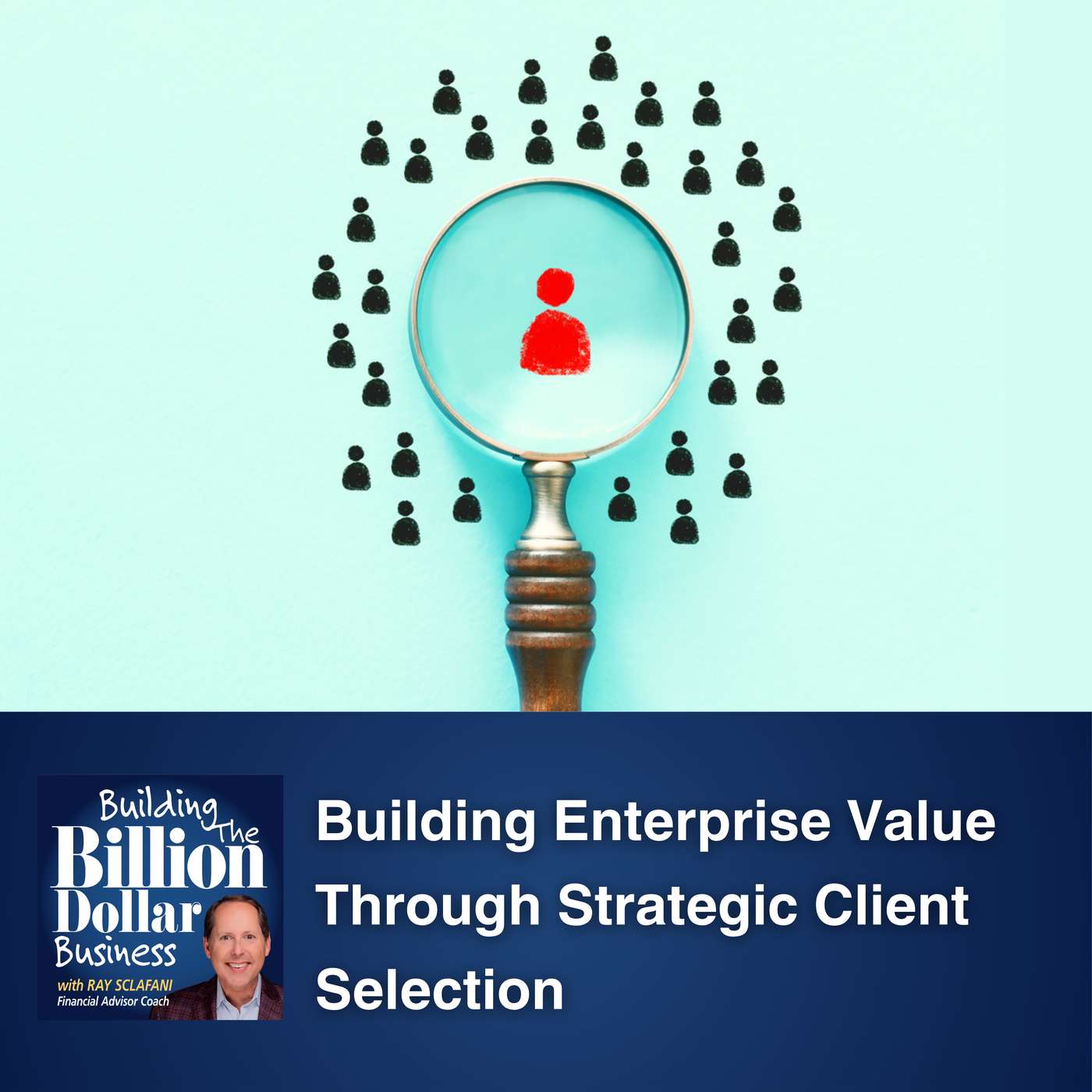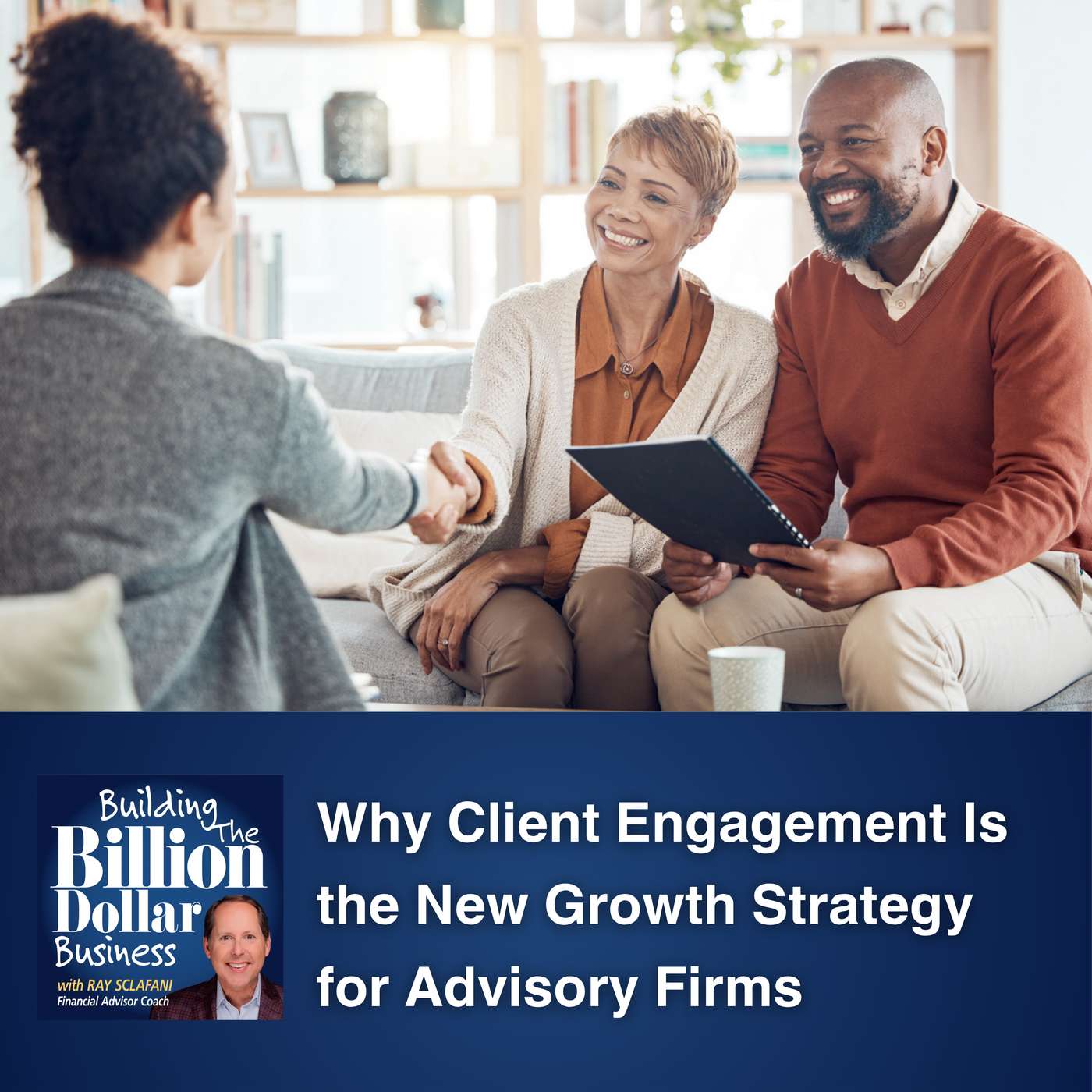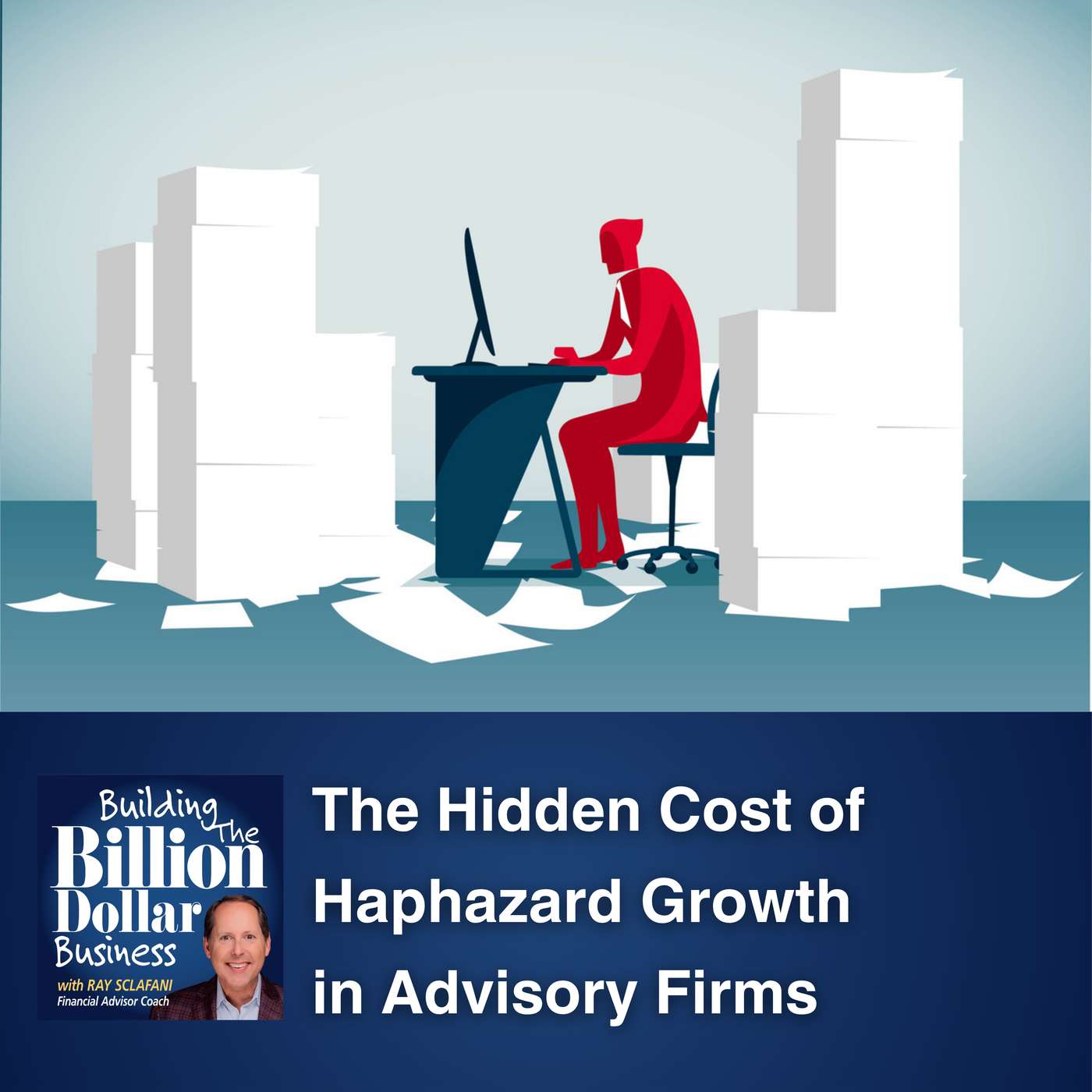Discover Building The Billion Dollar Business
Building The Billion Dollar Business

Building The Billion Dollar Business
Author: Ray Sclafani
Subscribed: 10Played: 168Subscribe
Share
© 2025 Ray Sclafani
Description
Hosted by Financial Advisor Coach, Ray Sclafani, "Building The Billion Dollar Business" is the ultimate podcast for financial advisors seeking to elevate their practice. Each episode features deep dives into actionable advice and exclusive interviews with top professionals in the financial services industry. Tune in to unlock your potential and build a successful, enduring financial advisory practice.
85 Episodes
Reverse
As the year comes to a close and ClientWise marks 20 years in business, Ray Sclafani shares a thoughtful year-end leadership reflection on what it truly takes to build an enduring wealth management firm.In this short, reflective episode of Building the Billion Dollar Business, Ray explains why long-term thinking has become a competitive advantage for financial advisors and why leadership depth is no longer optional. He introduces a practical three-year planning framework that helps advisory firm leaders balance reset, execution, and compounding growth while the business remains in motion.This episode is designed to help financial advisors step back, clarify priorities, and think beyond the next quarter without losing momentum. Ray also shares powerful coaching questions to guide year-end reflection, leadership growth, and intentional planning for the years ahead.Key TakeawaysEnduring advisory firms are built through long-term leadership thinking, not short-term reactionsA three year time horizon is far enough to create clarity but close enough to remain actionableStrong leaders reset, execute, and harvest results simultaneouslyPlanning does not require pausing the business; leadership happens while moving forwardThe future of wealth management remains strong for firms willing to invest with intentionQuestions Financial Advisors Often AskQ: What is the three year planning cycle for financial advisors? A: The three year planning cycle is a leadership framework that encourages advisors to plant seeds in year one, execute in year two, and see visible impact in year three, allowing for clarity without losing momentum.Q: Why is long term thinking important for advisory firm growth? A: Long term thinking helps advisory firm leaders make better trade-offs, avoid reactive decisions, and invest in people, systems, and leadership depth that compound over time.Q: How does leadership depth impact advisory firm success? A: Leadership depth is now a competitive advantage because enduring firms rely on strong teams and next-generation leaders, not just a single founder or rainmaker.Q: How can financial advisors plan while still running the business day to day? A: Effective leaders plan while the business is in motion by resetting what no longer works, executing current initiatives, and benefiting from prior investments all at once.Q: What should financial advisors reflect on at year end? A: Advisors should reflect on who they need to become as leaders, what they must stop tolerating, where to invest earlier, and who deserves recognition for their impact.Find Ray and the ClientWise Team on the ClientWise website or LinkedIn | Twitter | Instagram | Facebook | YouTubeTo join one of the largest digital communities of financial advisors, visit exchange.clientwise.com.
In this episode of Building the Billion Dollar Business, Ray Sclafani dives into how financial advisors can turn strategy into action using a Sorkin-style approach. Rather than relying on thick slide decks or polished documents, Ray emphasizes that strategy should be a story your team can act on today. Learn how to identify a single strategic intention, confront uncomfortable truths, and facilitate productive team dialogue that drives execution. Discover practical steps to align your team, prioritize high-impact decisions, and build a scalable, enduring advisory firm.Listeners will walk away with four actionable coaching questions to guide their next strategic moves and insights on developing leadership, succession, and enterprise growth in their advisory firm.Key TakeawaysChoose one clear strategic intention for your firm.Identify the top 2–3 obstacles threatening that strategy.Focus on execution, not perfect documents.Develop leadership and bench strength within your team.Questions Financial Advisors Often AskQ: What is a Sorkin-style approach to strategy?A: A Sorkin-style approach treats strategy like a compelling story, focusing on dialogue, decisions under pressure, and clear stakes. For financial advisors, it emphasizes team involvement, prioritization, and actionable direction rather than lengthy slide decks or abstract documents.Q: How can financial advisors turn strategy into execution? A: Advisors can turn strategy into execution by choosing one strategic intention, identifying top obstacles, confronting uncomfortable truths with their team, and facilitating structured retreats or discussions to make decisions and assign responsibility.Q: Why is single-intention strategy important for advisory firms? A: Focusing on one strategic intention prevents confusion, ensures alignment across the team, and allows advisors to make high-impact decisions that drive measurable growth and sustainable leadership.Q: How does this approach help build a scalable advisory firm? A: By clarifying priorities, delegating responsibilities, and developing leadership within the team, advisors create capacity for growth, reduce founder dependency, and build a firm that can endure and thrive over time.Find Ray and the ClientWise Team on the ClientWise website or LinkedIn | Twitter | Instagram | Facebook | YouTubeTo join one of the largest digital communities of financial advisors, visit exchange.clientwise.com.
In this episode of Building the Billion Dollar Business, Ray Sclafani dives into the strategies that top advisory firms use to level up their teams. Discover how feedback, self-reflection, and merit-based career paths drive engagement, performance, and growth. Ray shares actionable ideas for both leaders and team members to create a culture where ambition, curiosity, and development are rewarded.Learn why high-performing advisory teams invest in clear career paths, regular feedback, and stretch opportunities, and how these practices can accelerate talent development and firm growth. Whether you’re a firm leader or an advisor aiming to maximize your impact, this episode is packed with insights backed by research from Gallup, Harvard, Deloitte, McKinsey, and more.Key Takeaways:Career paths and performance expectations fuel engagement and development. Employees receiving meaningful feedback develop 3–4x faster.Challenging assignments cultivate skills that formal training alone cannot.Open communication about goals, learning needs, and strengths creates high-performing teams.Employees who actively manage their own development are more likely to become leaders.Questions Financial Advisors Often AskQ: How can financial advisors level up their team? A: Advisors can level up their team by providing regular feedback, creating clear career paths, promoting merit-based performance, and offering stretch opportunities for skill growth.Q: Why is feedback important for team development? A: Meaningful feedback accelerates employee growth, improves performance, and increases engagement, helping advisors develop high-performing teams.Q: How can team members take ownership of their growth? A: Team members can take ownership by reflecting on their performance, asking for feedback, volunteering for stretch responsibilities, and actively pursuing development opportunities.Find Ray and the ClientWise Team on the ClientWise website or LinkedIn | Twitter | Instagram | Facebook | YouTubeTo join one of the largest digital communities of financial advisors, visit exchange.clientwise.com.
In this episode, Ray explores one of the most overlooked leadership disciplines in advisory firms: off-boarding with intention, respect, and alignment. While most teams invest heavily in creating world-class onboarding experiences, few bring the same rigor to the moment when a team member exits. Ray shares why offboarding is not about correcting failure—it's about stewardship. When leaders navigate departures with clarity, dignity, and structure, they strengthen the culture, protect client relationships, and create space for the team to evolve.Through a candid example from his own team, Ray demonstrates how mutual clarity, co-creation, and a disciplined framework can turn a transition into an empowering moment for both the departing individual and the organization. He also walks through a seven-part offboarding framework inspired by SHRM best practices and years of coaching elite advisory firms, offering a practical blueprint firms can use to elevate their own internal processes.Ray closes with coaching questions leaders can use to refine hiring, strengthen feedback loops, and ensure that offboarding reinforces, not erodes, the culture they’ve worked hard to build.Key TakeawaysOffboarding is about stewardship, respect, and protecting your culture.Fit and alignment matter as much as skills.Clear, honest communication prevents surprises during transitions.Use a structured offboarding framework to stay consistent and professional.How you handle goodbyes shapes your culture just as much as onboarding.For more information click here to visit the Best in the Business Blog.Find Ray and the ClientWise Team on the ClientWise website or LinkedIn | Twitter | Instagram | Facebook | YouTubeTo join one of the largest digital communities of financial advisors, visit exchange.clientwise.com.
In this Thanksgiving episode, Ray Sclafani reflects on why gratitude is more than a seasonal sentiment for advisory leaders — it is a strategic advantage. Drawing from research, industry insights, and personal experience at ClientWise, Ray explores how appreciation strengthens culture, deepens engagement, and elevates performance across advisory firms.He highlights why recognizing people’s contributions is essential to leadership, offers meaningful reflection questions for advisors, and underscores that gratitude should lead to action: developing talent, raising standards, investing in future leaders, and preparing for the growth ahead.Ray closes with a message of appreciation to the ClientWise team and the advisory professionals they serve, encouraging leaders to use this season not as an endpoint but as a launchpad for impact in 2026.Find Ray and the ClientWise Team on the ClientWise website or LinkedIn | Twitter | Instagram | Facebook | YouTubeTo join one of the largest digital communities of financial advisors, visit exchange.clientwise.com.
In this episode of "Building the Billion Dollar Business," host Ray Sclafani delves into the strategies and insights behind successful financial advisory firms, focusing on organic growth and new client acquisition. He outlines six steps to boost growth, emphasizing the importance of client relationships, team collaboration, and strategic planning. Ray also discusses the significance of setting intentional goals and fostering a culture centered around growth.Key TakeawaysOrganic growth is a critical indicator of a firm's health.Understanding total relationship value (TRV) is essential.Generational continuity is key for long-term success.A focused marketing plan aligns with client needs.Utilizing CRM effectively identifies growth opportunities.Reframing culture around growth attracts talent.For more information click here to visit The Best in the Business Blog.Find Ray and the ClientWise Team on the ClientWise website or LinkedIn | Twitter | Instagram | Facebook | YouTubeTo join one of the largest digital communities of financial advisors, visit exchange.clientwise.com.
In this episode, Ray Sclafani discusses the implications of avoiding growth targets in business. He highlights a case where a company decided to stop setting growth targets to focus on client service. However, he argues that this decision led to challenges in managing capacity, planning succession, and fulfilling client promises. The conversation emphasizes the importance of balancing client service with the need for growth targets to ensure effective business management.Key TakeawaysGrowth happens whether you plan or notTrack revenue per professional, revenue per client, and time per client segmentMap retirements against junior advisor readiness and create a 3–5 year development planLet data guide leadership decisions by using dashboards and metrics to prevent overextension and burnoutPrevent “success outgrowing structure” by conducting quarterly capacity checks to evaluate workload, client demand, and team readinessFind Ray and the ClientWise Team on the ClientWise website or LinkedIn | Twitter | Instagram | Facebook | YouTubeTo join one of the largest digital communities of financial advisors, visit exchange.clientwise.com.
In this episode, Ray Sclafani discusses the importance of finishing the year strong and how it impacts the upcoming year. He emphasizes the need for a proactive mindset, strategies for success, and the significance of setting clear goals. He also covers overcoming challenges and maintaining motivation as key components of achieving success.Key TakeawaysHow you finish the year will determine how you start next year.Set clear goals for the new year to guide your actions.Overcoming challenges is part of the journey to success.Reflect on your progress this year to identify areas for improvement.Mindset shifts can lead to breakthroughs in performance.For more information click here to visit The ClientWise Blog.Find Ray and the ClientWise Team on the ClientWise website or LinkedIn | Twitter | Instagram | Facebook | YouTubeTo join one of the largest digital communities of financial advisors, visit exchange.clientwise.com.
In this episode, Ray Sclafani discusses the critical importance of having a well-defined compensation philosophy in financial advisory firms. He highlights the common pitfalls of compensation planning without a clear strategy and emphasizes the need for a structured approach that aligns pay with performance, culture, and profitability. The conversation covers the essential building blocks of a strong compensation philosophy, how to implement it effectively, and the impact it has on employee engagement and trust in leadership.Key TakeawaysMore than half the industry lacks a clear compensation strategy.Clear pay philosophies lead to lower turnover rates.Transparency in compensation processes fosters trust among employees.Regularly review and adapt your compensation philosophy to align with business changes.Involve team members in defining key performance metrics.A strong compensation philosophy reflects the firm's values and leadership style.For more information click here to visit the Best in the Business Blog.Find Ray and the ClientWise Team on the ClientWise website or LinkedIn | Twitter | Instagram | Facebook | YouTubeTo join one of the largest digital communities of financial advisors, visit exchange.clientwise.com.
In this episode, Ray Sclafani explores how advisory firm leaders can move from solo leadership to shared, high-performing teams. Using the metaphor of a musical ensemble, Ray shares lessons from his high school band and real-world coaching with billion-dollar firms to show how clarity, trust, and accountability create lasting success. Learn how to define team roles, foster trust, and lead through leadership transitions while keeping your firm’s performance in harmony.Key Takeaways Leadership is most effective when responsibility is shared across the team.Clear roles help every team member understand how they contribute to the bigger picture.Trust among team members strengthens performance and accountability.Transitions in leadership are opportunities to evolve and sustain firm value.Every team member’s contribution is essential, like instruments in a symphony.Click here for the Decision Making Problem Solving Model™. Find Ray and the ClientWise Team on the ClientWise website or LinkedIn | Twitter | Instagram | Facebook | YouTubeTo join one of the largest digital communities of financial advisors, visit exchange.clientwise.com.
The advisory industry is facing one of its greatest challenges yet; a looming shortfall of nearly 100,000 advisors over the next decade. In this episode of Building the Billion Dollar Business, host Ray Sclafani unpacks how firms can overcome the "Great Talent Squeeze" and become an employer of choice for next-generation advisors. Ray explores the critical mindset, cultural shifts, and strategic investments firms must make to attract, develop, and retain elite talent not just for today, but for the future of the business.Key Takeaways1. Culture isn’t invisible, it’s your most powerful advantage. Build an environment rooted in trust, inclusion, and authentic leadership to attract the best.2. Next-gen advisors expect modern tools. Investing in technology signals that your firm is forward-thinking and committed to advisor productivity.3. Go beyond salary. Explore rev-share, equity, or performance-based incentives to align advisor goals with firm success.4. Recruit ahead of capacity needs, benchmark compensation, and hold out for the right candidates to strengthen long-term growth.5. Focus on potential and leadership qualities. Build a clear career path and communicate it early in the hiring process.Click here for CFP Board 2024 Compensation StudyFind Ray and the ClientWise Team on the ClientWise website or LinkedIn | Twitter | Instagram | Facebook | YouTubeTo join one of the largest digital communities of financial advisors, visit exchange.clientwise.com.
In this short but powerful episode, Ray Sclafani tackles a topic many financial advisors avoid: pricing. As firms expand their services beyond portfolio management into multi-generational planning, tax coordination, and family governance, their value has increased, but too often, their pricing hasn’t.Ray challenges advisory leaders to view pricing not as a financial figure, but as a leadership decision that impacts enterprise value, team compensation, and client perception. He breaks down the mindset and mechanics required to evolve your pricing model with clarity, confidence, and consistency.This episode is a must-listen for firms committed to delivering premium services and ready to price like it.Key TakeawaysMost advisory firms are undercharging, not because clients can’t pay more, but because firms haven’t clearly defined and communicated their value.Legacy pricing models (flat AUM basis points) are misaligned with modern, complex service offerings.Advisors must embrace clarity, confidence, and consistency in how they present pricing.Top firms are evolving with tiered basis points, flat planning fees, and project-based pricing to reflect complexity.Find Ray and the ClientWise Team on the ClientWise website or LinkedIn | Twitter | Instagram | Facebook | YouTubeTo join one of the largest digital communities of financial advisors, visit exchange.clientwise.com.
In this episode, Ray Sclafani dives into a key leadership habit that high-performing advisory firms revisit every year: a structured marketing review. Far from a compliance audit, this annual reset is a strategic opportunity to realign messaging, optimize marketing systems, and attract the right clients for the future.Ray walks through the five essential areas to evaluate:Marketing calendar and planIdeal client segmentationValue proposition and capability deckMarketing collateral and communicationDigital presence and marketing systemsWhether your team is large or lean, in-house or outsourced, this episode outlines how to make marketing a firm-wide responsibility, not a side project. If you're ready to move beyond generic outreach and lead with intentional messaging, this is your playbook.Key TakeawaysA structured annual marketing review helps firms stay aligned, relevant, and client-focused.Without regular evaluation, your messaging can become outdated, misaligned, or unclear.Marketing should be collaborative and cross-functional, not owned by one person or department.Set 3–5 high-impact marketing priorities every quarter for measurable progress.Align internal messaging before launching external campaigns.Find Ray and the ClientWise Team on the ClientWise website or LinkedIn | Twitter | Instagram | Facebook | YouTubeTo join one of the largest digital communities of financial advisors, visit exchange.clientwise.com.
In this episode, Ray Sclafani challenges advisory firm leaders to rethink how they attract new clients. He exposes why many firms are unintentionally sabotaging their growth by relying on outdated, ad-hoc approaches to client acquisition like waiting for referrals or operating off of a founder’s charisma.Ray dives deep into what it takes to build a scalable, repeatable, and measurable lead generation engine. He covers:Why most firms can’t answer “How many new clients can we take on this year?”How to define and align your firm around the ideal future clientWhy a compelling, differentiated capability deck is essentialWhat it really means to “own your niche”The difference between a hope list and a functioning pipelineThis episode is a wake-up call, and a roadmap, for advisors who want to lead their growth, not just react to it.Key TakeawaysFirms must calculate their true client carrying capacity before setting growth goals.Growth requires clarity around the ideal future client, not just a general idea of your current book.True differentiation comes from owning a niche so specifically that you become the obvious referral.Firms that rely on one person’s memory or relationships aren’t building a business, they’re creating a vulnerability.Find Ray and the ClientWise Team on the ClientWise website or LinkedIn | Twitter | Instagram | Facebook | YouTubeTo join one of the largest digital communities of financial advisors, visit exchange.clientwise.com.
In this episode, Ray Sclafani introduces a critical metric that leading wealth management firms—and the private equity firms evaluating them—are using to assess the health and enterprise value of their businesses: the Rule of 40. Originally born in Silicon Valley to evaluate SaaS companies, this simple but powerful formula (Revenue Growth % + EBITDA Margin %) has crossed over into the RIA world and become a litmus test for intentional, sustainable growth.Ray breaks down:What the Rule of 40 really means in a recurring revenue business like an RIAHow to calculate it (with real examples from ClientWise client firms)Where it falls short if misusedHow the most forward-thinking advisory firms use it as a leadership, compensation, M&A, and strategy toolPlus, you’ll get five coaching questions to spark powerful conversations with your team—and begin leading like a CEO, not just a lead advisor.Key TakeawaysThe Rule of 40 = Revenue Growth % + EBITDA Margin %, and if the total equals or exceeds 40, your firm is financially healthy.Many firms overestimate their growth by including capital market gains or acquired AUM—only organic growth tells the real story.Leading RIAs use the Rule of 40 not just as a metric, but as a strategic lens.Tracking Rule of 40 over time and by business segment (organic growth, next-gen, core team) uncovers the real levers driving enterprise value.If your growth is passive or your margin is inflated, the Rule of 40 exposes the imbalance and forces better leadership decisions.Find Ray and the ClientWise Team on the ClientWise website or LinkedIn | Twitter | Instagram | Facebook | YouTubeTo join one of the largest digital communities of financial advisors, visit exchange.clientwise.com.
In this episode, Ray Sclafani challenges financial advisors to shift from simply managing a successful practice to thinking like a CEO and capital allocator. Drawing parallels to the booming subscription economy, Ray explains how advisory firms, powered by predictable AUM-based revenue, are in a prime position to reinvest with purpose.Whether it’s developing leadership, upgrading tech, or expanding into new client markets, this episode offers a compelling call to action: don’t coast on recurring revenue, leverage it. Learn how elite firms are acting boldly and investing in infrastructure, talent, and strategic growth to command premium valuations and build enduring enterprises.Key TakeawaysYour AUM fee model gives you predictable cashflow, so you should treat it like a competitive advantage.Don’t just preserve profits, deploy them in ways that support scalable, long-term growth.Top valuations go to firms with vision, strategy, systems, and momentum, not necessarily the largest AUM.Forecast with confidence and use recurring revenue to fund your firm’s future.Find Ray and the ClientWise Team on the ClientWise website or LinkedIn | Twitter | Instagram | Facebook | YouTubeTo join one of the largest digital communities of financial advisors, visit exchange.clientwise.com.
In this episode of Building the Billion Dollar Business, Ray Sclafani explores one of the most underutilized but essential skills in financial advisory: the art of choosing clients wisely. Shifting from “more clients, more assets” to “right clients, sustainable growth,” Ray outlines how high-performing firms assess both behavioral and financial indicators to identify their next generation of A+ clients—even before they build wealth.He introduces a client selection framework that focuses on advice-receptivity, future potential, values alignment, and more—all geared toward improving enterprise value through predictable cash flow. Ray also offers coaching questions to help leaders train their teams, align their growth strategy, and build a firm designed for the future.Key TakeawaysStrategic firms focus on those who enhance predictable cash flow and align with long-term goals.Traits like curiosity, respect for process, and ambition signal a high-value client even before assets arrive.Scorecards, life-event triggers, and fee-based onboarding help firms assess clients strategically.When firms define who they’re built to serve, growth strategies, referrals, and client experiences improve.Find Ray and the ClientWise Team on the ClientWise website or LinkedIn | Twitter | Instagram | Facebook | YouTubeTo join one of the largest digital communities of financial advisors, visit exchange.clientwise.com.
In this episode of Building the Billion Dollar Business, Ray Sclafani explores the profound demographic shift reshaping the financial advisory industry: the aging of America. With 10,000 Americans turning 65 every day, and 80% of U.S. wealth held by those over 60, advisors can no longer afford to focus solely on accumulation. Ray outlines three powerful shifts advisory firms must make to stay relevant: reframing their value proposition, building capacity for aging clients, and leading multigenerational family dialogues. Packed with data, practical strategies, and team reflection questions, this episode is a must-listen for firms ready to evolve into future-ready advisors.Key Takeaways Future-ready advisory firms go beyond money management, addressing deeply personal questions around spousal transitions, family readiness, and legacy.Americans spend an average of 12.4 years in poor health at life’s end, with medical expenses potentially exceeding $472,000 per couple, this must be planned for.Top firms are integrating elder care planning, collaborating with estate attorneys, healthcare advocates, and geriatric specialists to support aging clients.70% of heirs and 80% of widows leave their advisor after a wealth transfer. This signals a lack of relationship, not a lack of financial performance.Building expertise via partnerships helps firms address issues like long-term care, dementia, and multigenerational needs more effectively.Find Ray and the ClientWise Team on the ClientWise website or LinkedIn | Twitter | Instagram | Facebook | YouTubeTo join one of the largest digital communities of financial advisors, visit exchange.clientwise.com.
In this episode of Building the Billion Dollar Business, host Ray Sclafani reframes what it truly means to engage clients in a modern wealth management practice. He challenges the common misconceptions of client engagement which includes emails, gifts, and review meetings, and instead defines true engagement as emotional, intentional, and rooted in value. Ray outlines three pillars of effective engagement: proactive conversations, customized communication, and meaningful milestone recognition. He emphasizes that real engagement must be embedded into firm culture, not just left to the advisor. Listeners are encouraged to use tools like client journey mapping, achievement reviews, and feedback loops to scale meaningful connections. The episode closes with three reflective coaching questions designed to help advisors evolve their approach and deepen client relationships in a commoditized landscape.Key TakeawaysTrue engagement is emotional, intentional, and value-driven, where clients feel genuinely seen, heard, and understood.Effective engagement is built on three pillars: proactive conversations that anticipate client needs, customized communication that aligns with how each client processes information, and meaningful recognition of personal milestones.It must be embedded into the culture of the entire firm, not dependent on any one advisor, and requires clear systems, roles, and shared ownership to scale.In today’s experience-driven world, clients compare their advisors to brands like Amazon, Apple, and Netflix, expecting personalization, speed, and relevance.When done well, client engagement becomes a strategic asset, creating loyalty, increasing referrals, and strengthening cross-generational relationships.Find Ray and the ClientWise Team on the ClientWise website or LinkedIn | Twitter | Instagram | Facebook | YouTubeTo join one of the largest digital communities of financial advisors, visit exchange.clientwise.com.
In this episode of Building the Billion Dollar Business, Ray Sclafani dives into one of the most overlooked dangers facing advisory firms today: haphazard growth. While expanding your team, client base, and offerings may look like success on the surface, growth without intention can breed operational chaos, erode client trust, and reduce long-term enterprise value. Ray outlines the difference between reactive expansion and purposeful scaling, and offers a five-part blueprint for building a sustainable growth strategy that creates real client impact.Listeners will walk away with a sharper understanding of how to reframe growth as a client-centered initiative, not just a business metric. Plus, Ray offers three powerful coaching questions to assess your firm's current trajectory and uncover whether your growth is building trust—or just making noise.Key TakeawaysScaling without value creation can lead to insolvency, not increased enterprise worth.Haphazard growth is reactive, adding services or people without clarity or alignment.Intentional growth begins with segmentation: know who you’re built to serve best.Understand what your team can handle before quality slips.Develop clear hiring, career paths, and retention strategies.Communicate growth clearly so clients know how it benefits them directly.Firms that win will be the most intentional, not necessarily the largest.Find Ray and the ClientWise Team on the ClientWise website or LinkedIn | Twitter | Instagram | Facebook | YouTubeTo join one of the largest digital communities of financial advisors, visit exchange.clientwise.com.


